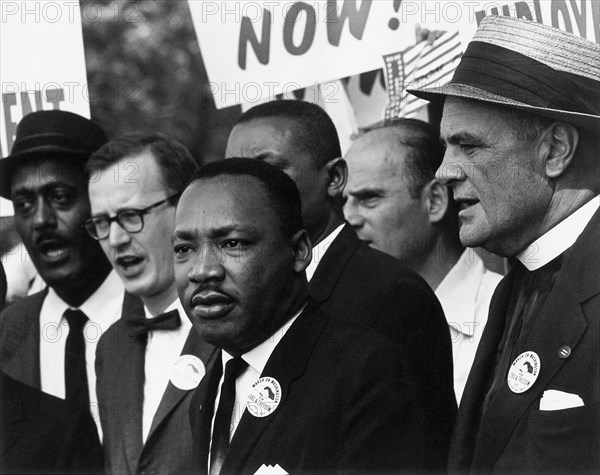
même sujet
Mlk12
Sujet
Martin Luther King Jr. at the March on Washington. The March on Washington for Jobs and Freedom, the March on Washington, or The Great March on Washington, was held in Washington, D.C. on Wednesday, August 28, 1963. The purpose of the march was to advocate for the civil and economic rights of African Americans. At the march, Martin Luther King Jr., standing in front of the Lincoln Memorial, delivered his historic "I Have a Dream" speech in which he called for an end to racism. The march was organized by A. Philip Randolph and Bayard Rustin, who built an alliance of civil rights.
Légende
The March on Washington for Jobs and Freedom, the March on Washington, or The Great March on Washington was held in Washington, D.C. on Wednesday, August 28, 1963. The purpose of the march was to advocate for the civil and economic rights of African Americans. At the march, Martin Luther King Jr., standing in front of the Lincoln Memorial, delivered his historic "I Have a Dream" speech in which he called for an end to racism.[3]
The march was organized by A. Philip Randolph and Bayard Rustin, who built an alliance of civil rights, labor, and religious organizations[4] that came together under the banner of "jobs and freedom."[5] Estimates of the number of participants varied from 200,000 to 300,000;[6] the most widely cited estimate is 250,000 people.[7] Observers estimated that 75–80% of the marchers were black.[8] The march was one of the largest political rallies for human rights in United States history.[5]
The march is credited with helping to pass the Civil Rights Act of 1964 and preceded the Selma Voting Rights Movement which led to the passage of the Voting Rights Act of 1965.
Info+
Photographe : American Photo Archive
Date
28 août 1963
Crédit
Photo12/Alamy/American Photo Archive
Notre référence
LMY23T03_R66K2A
Utilisation
uniquement en France
Model release
Non
Property release
Non
Licence
Libre de droits
Format disponible
19,9Mo (722,3Ko) / 25,1cm x 19,9cm / 2961 x 2348 (300dpi)